Is it time for a kitchen countertop replacement? Kowalske is here to guide you in choosing the best countertop material for your Milwaukee or Waukesha kitchen. Maybe you don’t like the color, material or style. Or maybe this project is part of a larger kitchen remodel. With so many options, choosing the material can be a perplexing and daunting task. The options may seem limitless, but there are only just a handful of materials used and recommended for the kitchen. The best kitchen countertop materials used today include quartz, wood or butcher block, granite, laminate, marble, solid surface, porcelain slabs and blended materials.
You don’t have to do this alone – our expert designers are here to help! When you work with Kowalske Kitchen & Bath, we guide you through the entire countertop selection process. To ensure you are choosing what’s best for you and your family, we will ask all the right questions about your lifestyle, needs, and style!
The most popular kitchen countertop materials include:
1. Quartz Countertops in the Kitchen
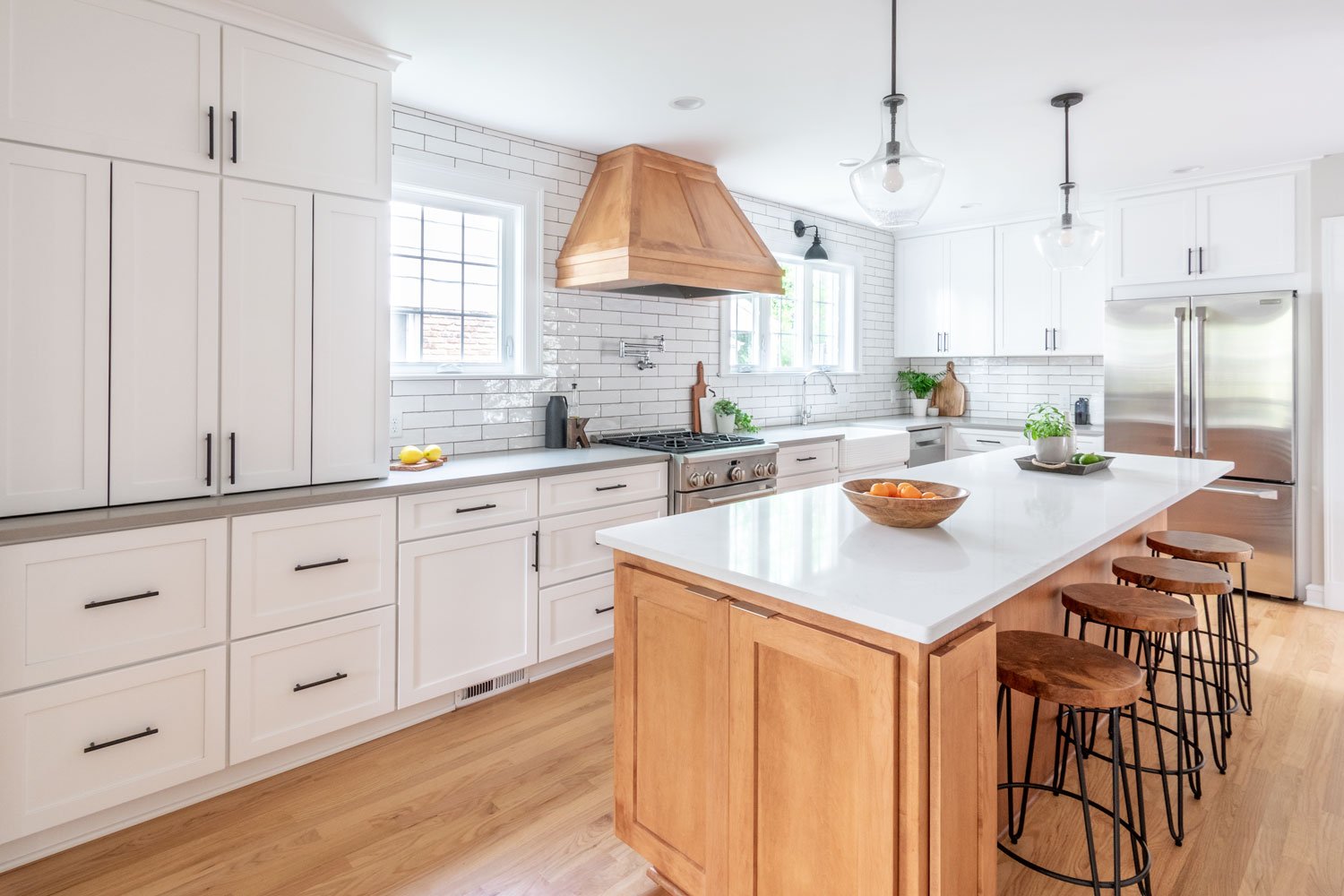
Homeowners often think “granite” first, but quartz (or engineered stone) countertops are the most popular surface for kitchen remodeling projects. For one, it’s tough and can withstand the wear and tear of daily living. If you like to cook, have kids or use your kitchen regularly, quartz is for you!
It all begins in the manufacturing process. The raw materials are mixed together, put into a mold, compressed to form slabs, and then the slabs are dried and heated. After that, finishing touches are added!
Quartz countertops give you a lot of room for flexibility and creativity. Choose any color or style. Common selections include white, gray, beige, brown and black. Finishes range from sandblasted to glossy to embossed to honed. Whether you like the look of marble, large veining, concrete or a solid color, quartz offers hundreds of options.
Pros
- Extremely hard and durable
- Flexible properties make quartz countertops less likely to chip or crack than other similar surfaces
- Highly stain resistant
- Never needs resealing
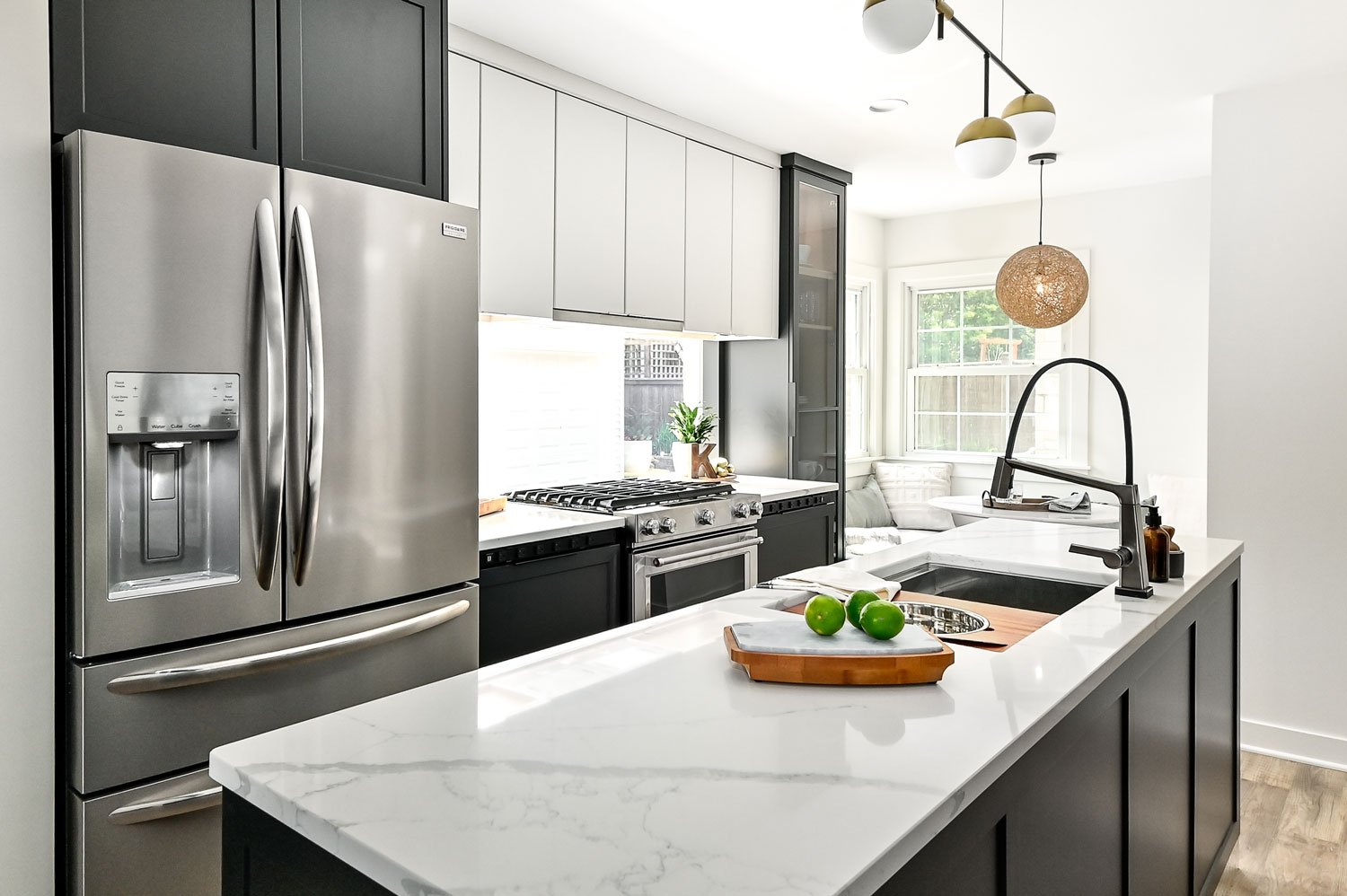
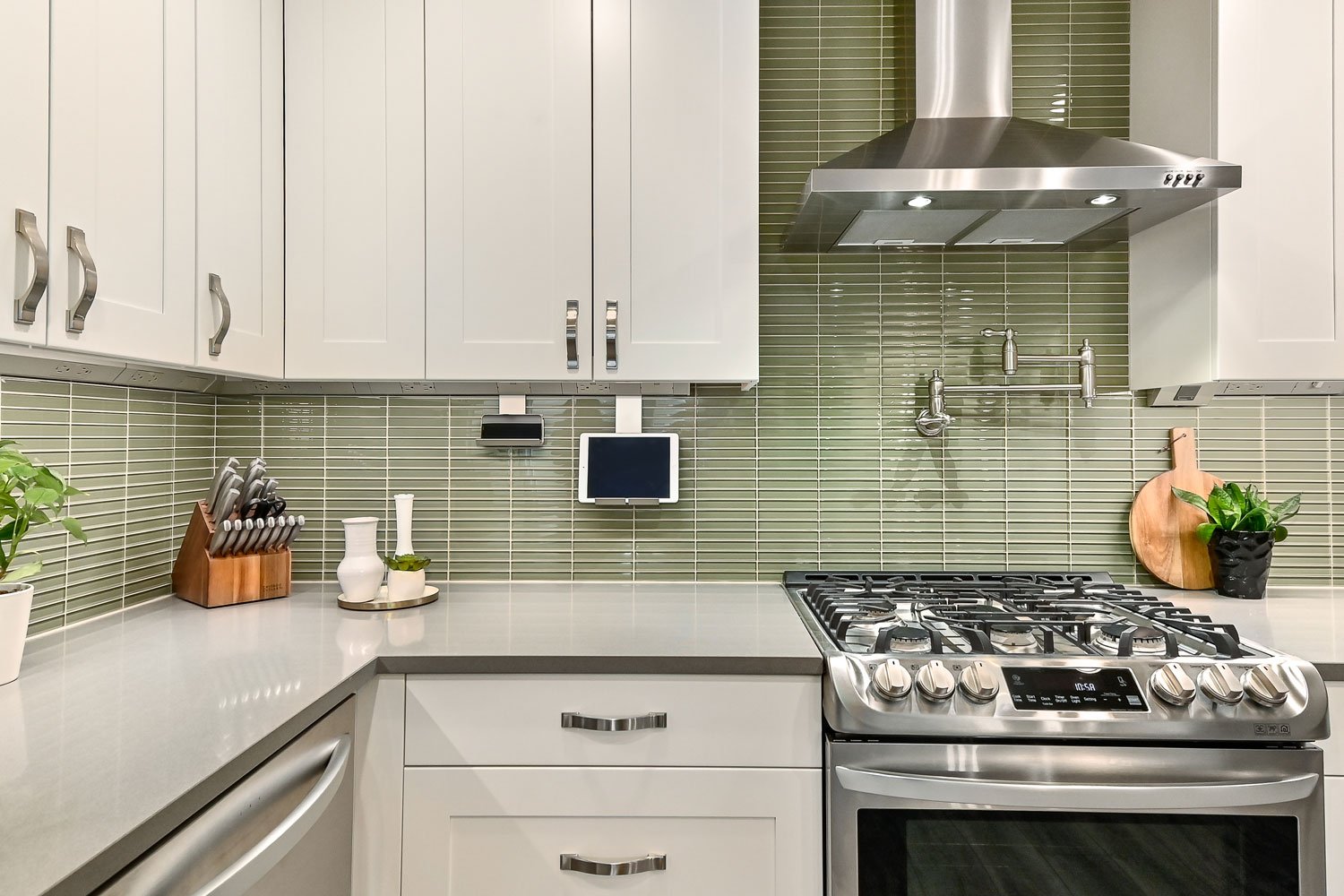
Cons
- Quartz, in very rare circumstances, can discolor over time with regular exposure to sunlight. Sections of the counter that get exposed to UV rays may begin to look different with prolonged sun exposure.
- Unless most recent best practices are used, seams will show, particularly on lighter color quartz countertops
- The price of quartz countertops is among the highest in kitchen countertop options
- Relatively weak tolerance to heat
Kowalske Kitchen & Bath works with numerous high-quality quartz vendors:
2. Wood or Butcher Block Counters
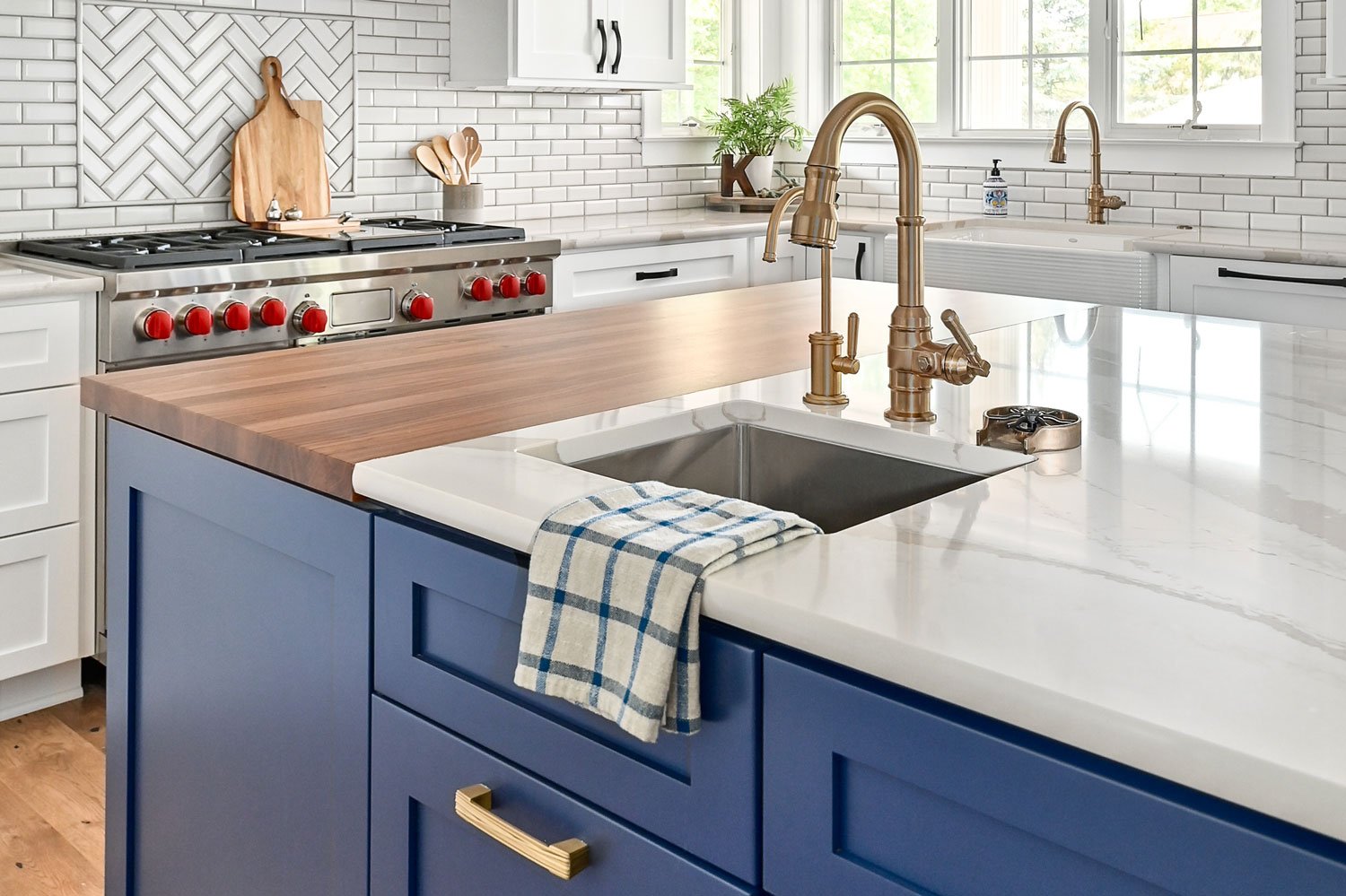
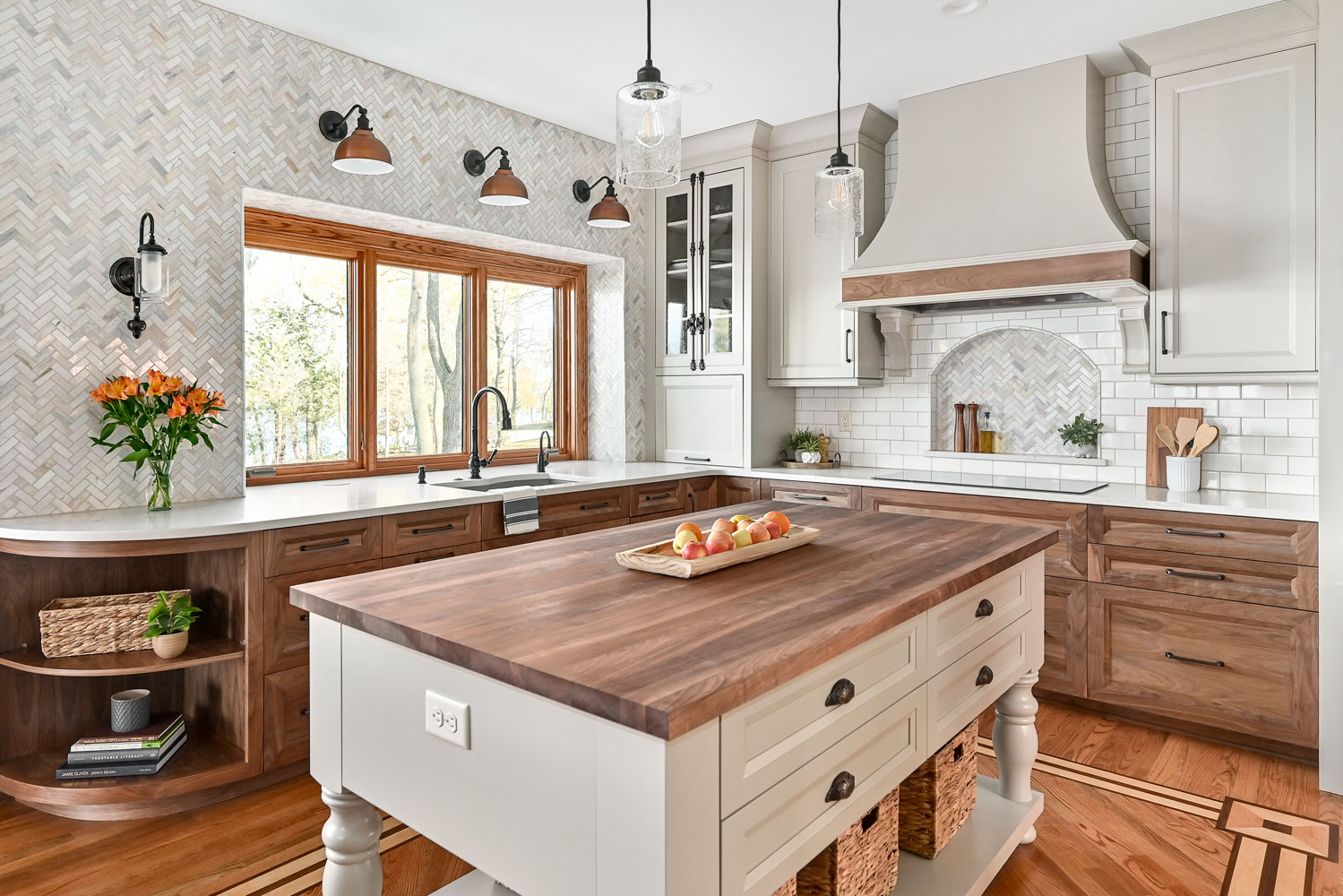
Who doesn’t love the cozy look of a quaint and warm kitchen? Continuing to be a popular choice for homeowners, wood butcher block counters offer many different choices and match a variety of kitchen styles. Wood countertops are accommodating, long-lasting and affordable.
There is a wide range of wood types used for countertops. Hardwood adds a rustic touch to homes and is used extensively in modern home building and renovations. Maple, cherry, oak, birch and teak are also popular types of wood countertops. At Kowalske, we partner with John Boos for butcher block counters to give you the top-quality look you want.
Pros
- Adds a feeling of warmth and beauty to a kitchen that no other material can match
- Incredibly versatile and can go with just about all kitchen styles
- Durable surface for food preparation processes
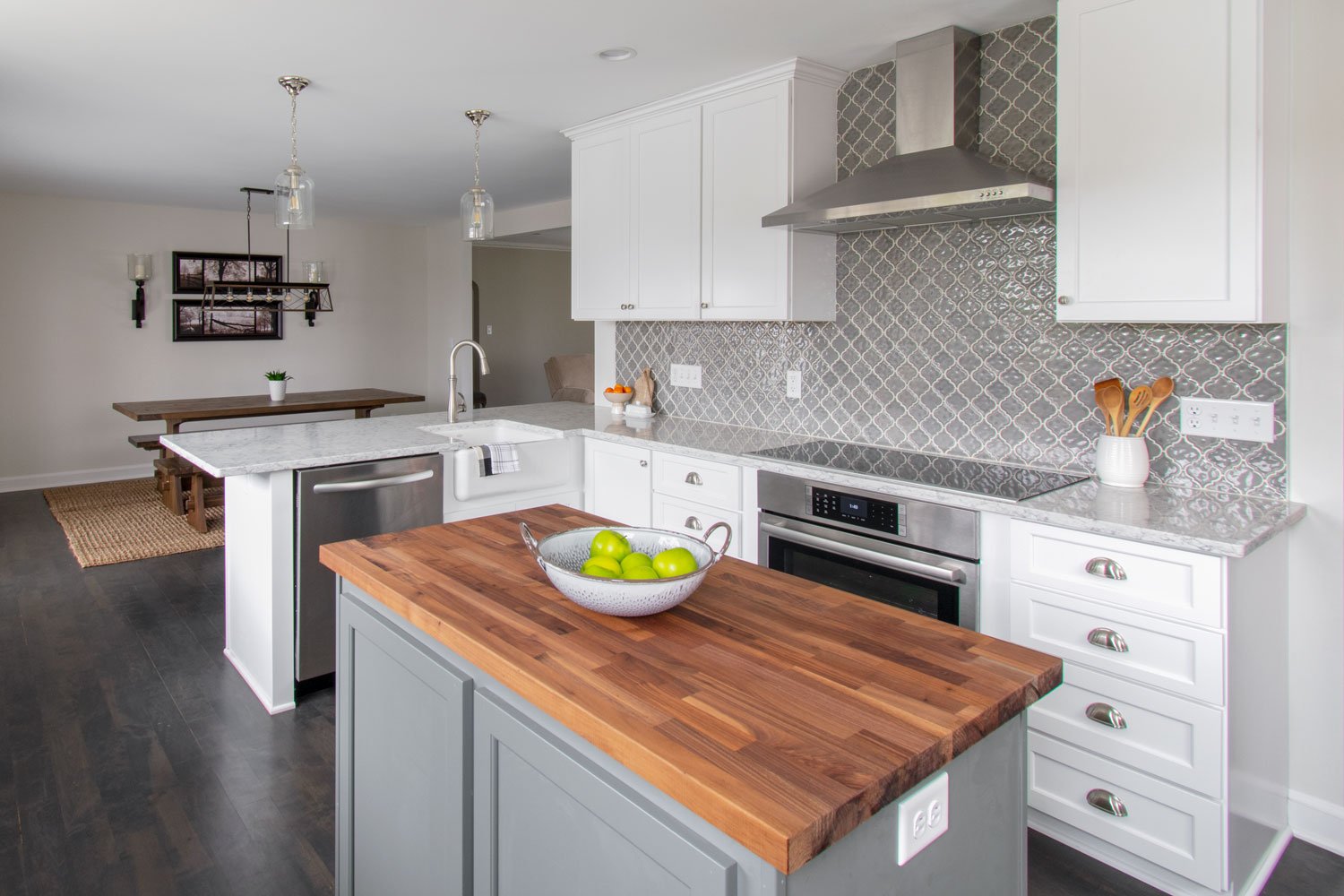
Cons
- If not sealed properly, wood countertops can store germs inside its porous surface.
- Periodic refinishing may be needed.
- Wood is susceptible to water damage.
- Wood is softer than other countertop materials and can be damaged easier. Keep a cutting board handy.
3. Granite Countertops
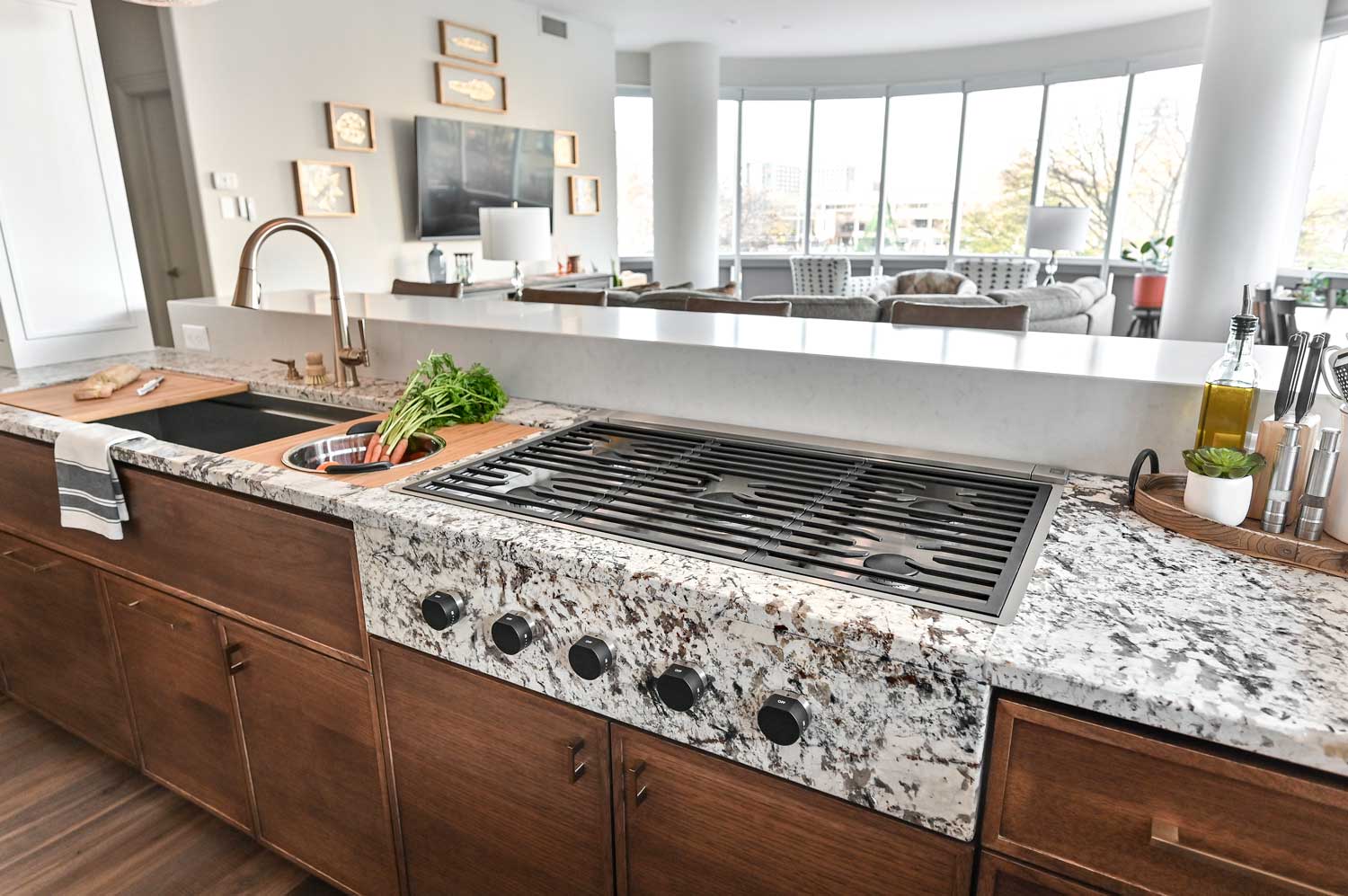
It’s no secret that granite countertops in the kitchen offer a rich beauty that will improve the look and style of your entire kitchen. They will bring your kitchen space to a new level of elegance, and come available in many exotic options. Every piece of granite is unique, which will set your kitchen apart. Although costly and labor-intensive, granite is a look that many homeowners believe is well worth that extra money and effort. Beyond that, they are durable with a long life span, as well as resistant to heat, stain and moisture. If properly cared for, they will last for years and years.
Pros
- Every granite slab is unique with varying shades, lines, and patterns
- Granite countertops are wise investments, adding value to your home
- Granite is a sturdy, scratch-resistant material that will last for decades
- You can place hot pots and pans directly on the surface without damaging granite
- Adequately sealed granite countertops are extremely stain resistant
Cons
- Prone to cracking and chipping
- Slab seams will be visible on countertops
- Granite is expensive; installation is costly and labor-intensive
- May require additional structural support
- Granite will stain, so don’t forget to seal it on a regular basis
4. Laminate Counters
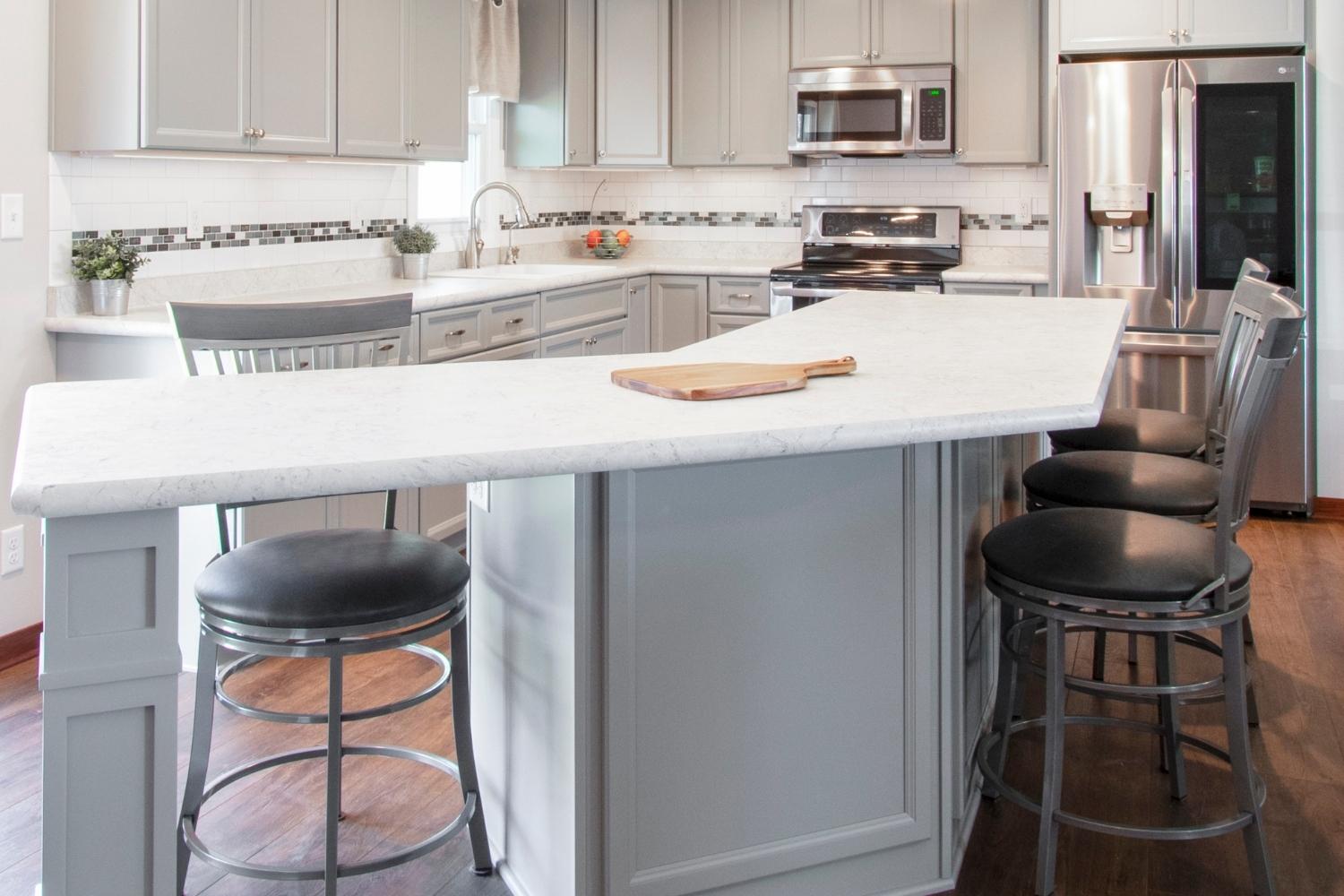
In the 1960s, laminate countertop reached the height of its popularity, but remain an affordable and viable option for kitchen designs today. They may lack the reputation of prestige seen with other choices, but have come a very long way since their inception. Laminate countertops are now of much higher quality and come in hundreds of styles and colors. While not as durable as certain other types of countertops, they are much lower in cost. If you are on a tight budget, this just may be the best countertop choice for your kitchen.
Pros
- Typically the least expensive countertop material and most widely available for kitchen countertops
- A handy DIY enthusiast can install a laminate countertop
- Colors, textures, and edge profiles that are available have come a long way since your great grandma installed them in her kitchen
Cons
- Prone to damage caused by hot pans and knife scratches
- Damaged sections are hard to repair
- Will not add to the resale value of the property
5. Marble Kitchen Countertops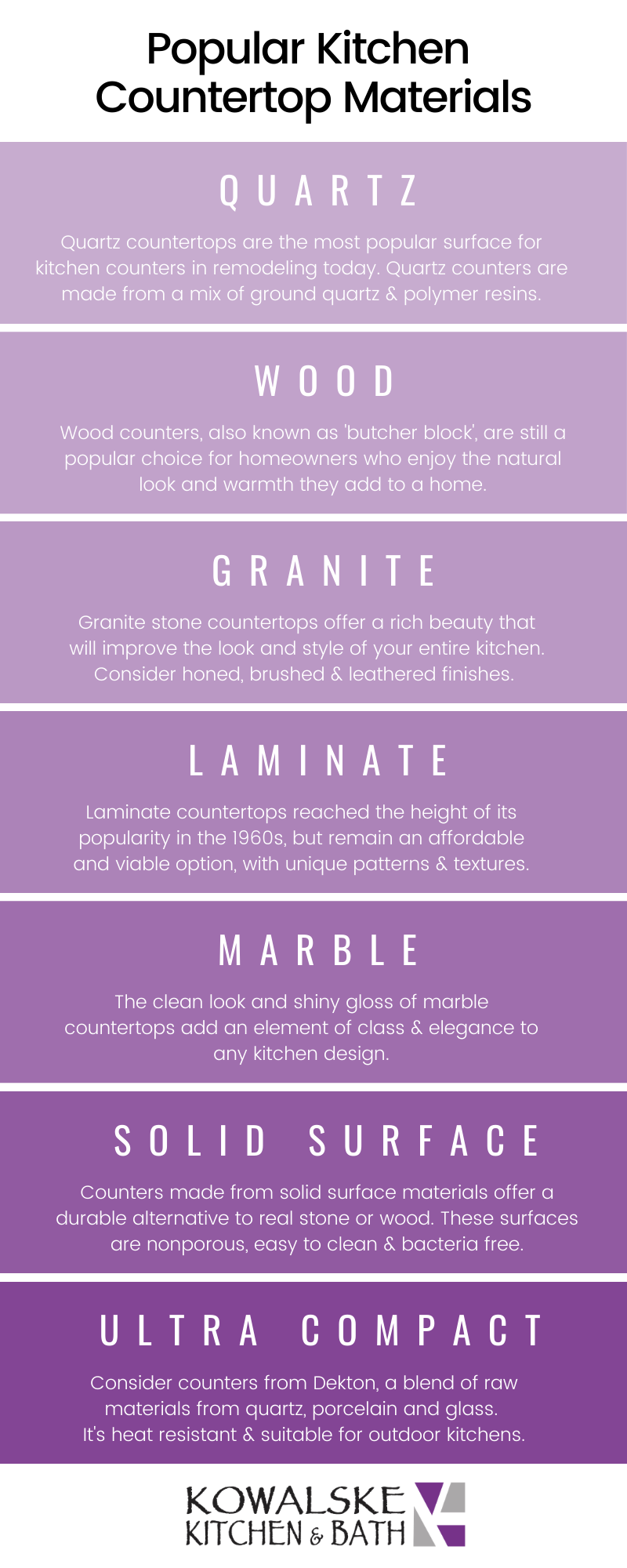
The clean look and shiny gloss of marble countertops add an element of class and elegance to any kitchen design. They bring a breathtaking richness of character that is hard to find in other types of countertop materials. Although marble can be costly, you could find a quartz counter that mimics the look. Considered the epitome of luxury in the world of countertops, marble can add notable value to your home.
Not only is marble – which is cool to the touch – an ideal surface for cooking and baking, it lasts a long time if properly maintained. However, you do need to treat your marble with care as it can be scratched, stained and damaged more easily than other types of countertops.
Pros
- Simply stated, marble countertops are beautiful, bright and timeless
- When common marble is used, marble countertops are among the least expensive types of natural material
- Materials are widely available
Cons
- Susceptible to scratching
- Easily stained
- Relatively soft compared to other surfaces
6. Solid Surface Countertop Materials
Countertops made from solid surface materials offer a durable alternative to real stones or wood. Fabricated to resemble granite, stone and marble, solid surface countertops are enjoyed for the combination of beauty and performance they bring to homeowners.
You are likely familiar with brands such as Corian and Formica. Manmade using acrylic or polyester resins, they are available in hundreds of patterns and colors. Aesthetically they are very pleasing to the eye, molded to seamlessly fit. Though less durable than a surface like granite, they are hard and impact-resistant. Most damage can be fixed quite easily, with the ability for stains and scratches to be sanded away.
Pros
- Hard, solid surface
- Non-porous and resistant to bacterial growth
- Versatility allows for a wide range of colors and shapes, with different types of edge finishes
Cons
- Installation is labor-intensive
- Heat can cause discoloration or disfigurement
- Susceptible to scratches
Check out some of the solid surface options available from our fabricator K.G. Stevens.
7. Ultra-Compact Countertops
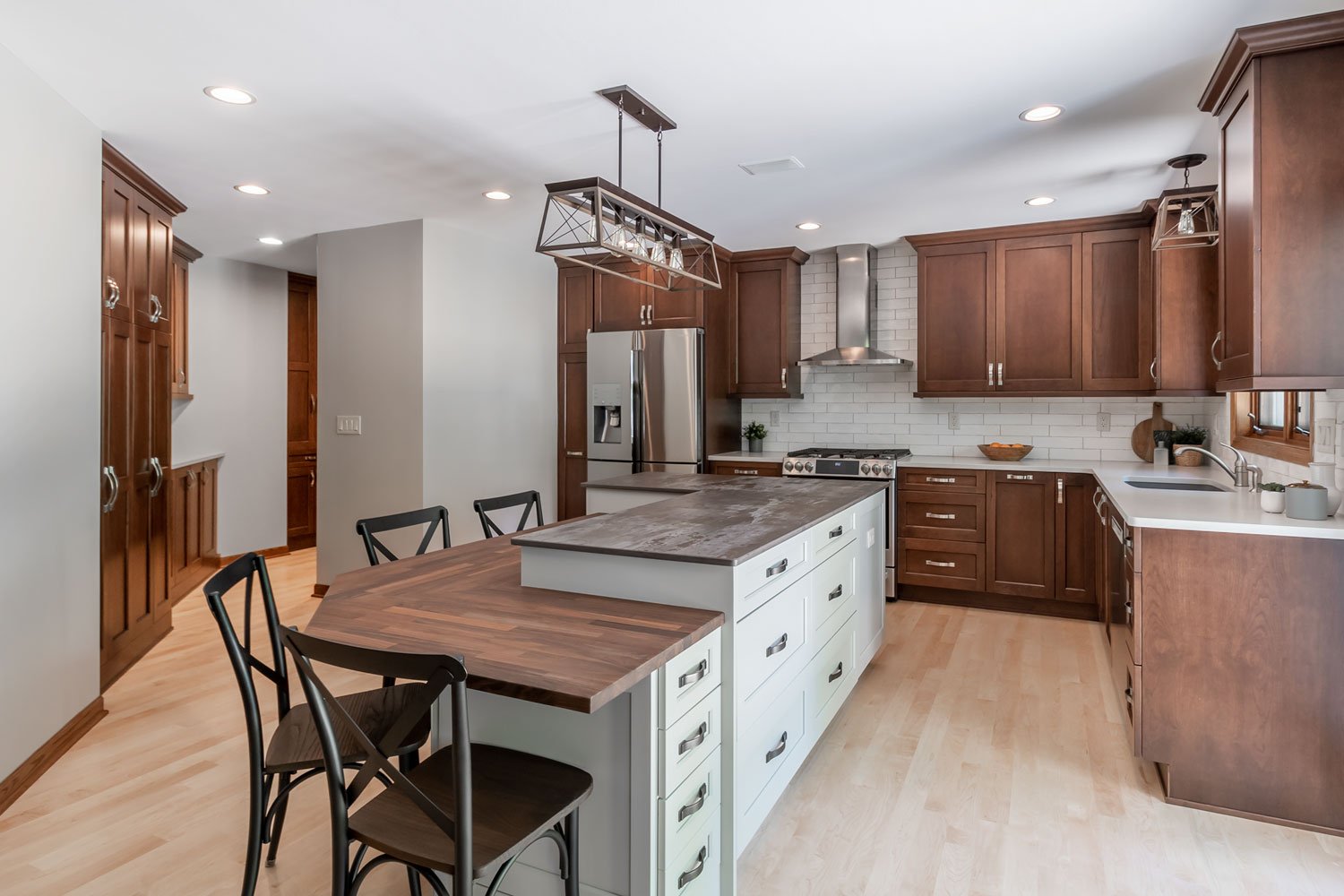
As technology changes, new and exciting products continue to hit the market. One of these innovative countertop materials is called “ultra-compact” and is created through a unique fabrication process known as Sinterized Particle Tech, which involves mixing the raw elements under high temperatures and intense pressure.
There are many pros to this option. Heat-resistant and great for both indoors and outdoors, this blend of raw materials from quartz, porcelain and glass has many positives. These countertops are extremely durable and can withstand just about any condition. You never worry about setting hot pans on the counters or discoloration over time. However, they are still rare which makes them difficult to find. Dekton is one well-known provider we trust at Kowalske Kitchen & Bath.
Pros
- Resistant to water, stains, scratches, heat, UV rays and freezing/thawing
- Comes available in large slab sizes
- Totally uniform surface with no cuts or joints
- Suitable for installations for outdoor kitchens and barbecues
Cons
- Limited options for fabricators and installers
- Limited availability as they are not carried by many companies
- Can be more costly than the average countertop
Get Started: Kitchen Countertop Selection
There are many choices for kitchen countertop materials. The functionality of each material is based on how it’s made and the geology, properties and science behind it. Choose the material that works the best for your aesthetics and lifestyle.
Designing your custom kitchen can be a rewarding experience. Creating a unique kitchen aesthetic can influence the tone of your entire home. Discuss ideas for your kitchen countertop replacement by scheduling an appointment with a Kowalske designer.
Learn More
- Kitchen Remodeling Ideas for Hosting & Entertaining
- How to Clean Your Kitchen Counters
- Kitchen Backsplash Ideas
- How to Start Planning a Kitchen Remodel
———————-
Author:
Mandy Lee is a contributor to Innovative Green Building Materials. She is a blogger and a content writer for the building materials industry. Mandy is focused on helping fellow homeowners, contractors, and architects discover materials and methods of construction that increase property value, maximize energy savings, and turn houses into homes.
